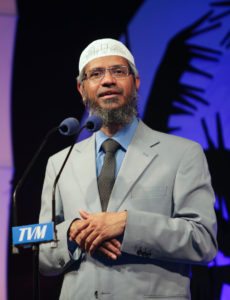Indian Government Bans Controversial NGO
 On November 15, the Indian government banned the Islamic Research Foundation, a non-governmental organization founded by controversial Islamic preacher Zakir Naik. The government used the Indian Unlawful Activities Prevention Act as justification.
On November 15, the Indian government banned the Islamic Research Foundation, a non-governmental organization founded by controversial Islamic preacher Zakir Naik. The government used the Indian Unlawful Activities Prevention Act as justification.
Zakir Naik has stirred up controversy in India due to his alleged role in “promoting enmity” among religions, as well as his sympathy to terrorists and terrorist organizations. For this case, the Intelligence Bureau, India’s intelligence agency, compiled some of Zakir Naik’s speeches, which included justifications for forced conversions and suicide bombings, as well as disparaging comments against Hinduism and Sikhism. The Union Cabinet of India decided to ban the Islamic Research Foundation on the grounds that this kind of speech disturbed communal harmony and threatened to radicalize more young men into the world of terrorism.
The Islamic Research Foundation’s connections to Peace TV, which has aired Zakir Naik’s speeches in the past, also figured in the decision to outlaw the organization. The government has accused Peace TV, which is currently banned in India, of inciting terrorism. However, it continues to air in other countries, such as Bangladesh, where the channel influenced the perpetrators of the July 2016 terrorist attacks in Dhaka.
According to the Global Terrorism Index, India was the sixth country most affected by terror in 2014, with 416 terror-related deaths. Conflict and instability in Kashmir have been the main source of these attacks, but incidents occur throughout the country. Perhaps most notable among these incidents were the 2008 attacks in Mumbai, which included an assault on the famous Taj Hotel. The Indian government considers stopping terrorism a priority.
Terrorism in India has also contributed to the rise of Hindu nationalism, or Hindutva, which India’s ruling party, the Bharatiya Janata Party (BJP), supports. This ideology has helped inflame Islamophobia in India, which came to a climax in the 2002 Gujarat Riots. Rioters targeted and killed around 2,000 Muslims, though they also killed approximately 700 Hindus. The riots, terror attacks, and recent case of Zakir Naik illustrate that India faces a problem that is prevalent in many Western countries: how to combat radicalism without discriminating an entire religion.
